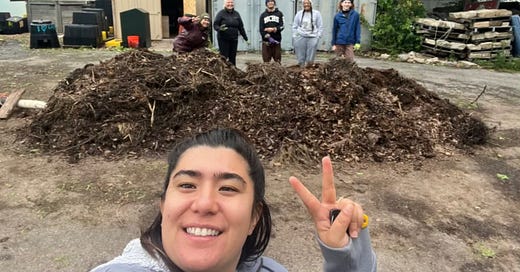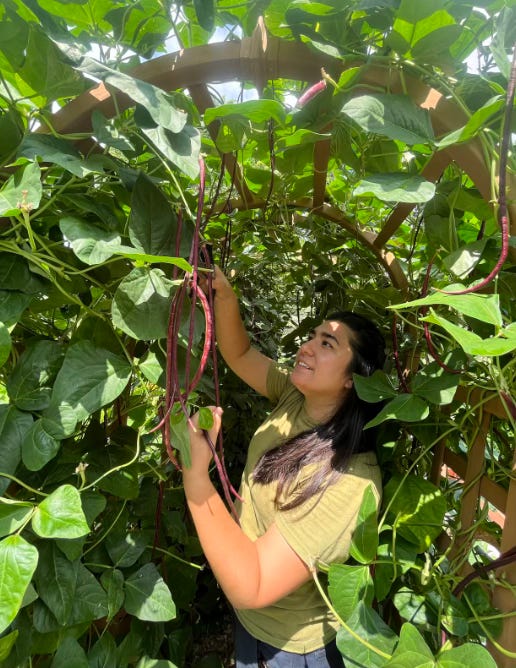Encababian: Why or how do you want to include principles of agroecology in your work?
By: Chelsea Encababian, Lecturer & Course Coordinator of Sustainable Urban Agriculture at LaGuardia Community College
Chelsea Encababian is a lecturer and the inaugural leader of LaGuardia Community College's Sustainable Urban Agriculture Track. She began her journey in urban farming in Ecuador, guiding gap-year students on sustainable farming projects. She deepened her expertise while working with GrowNYC’s Recycling Champions Program and as the Compost Project Manager at the Queens Botanical Garden.
Chelsea holds a master’s degree in Sustainability in the Urban Environment from the City College of New York and a bachelor's degree from Hobart and William Smith Colleges, where she studied food systems in the Finger Lakes region. At LaGuardia, Chelsea blends hands-on learning with a service-driven curriculum, using the LaGuardia Urban Farm as a dynamic outdoor classroom. Her approach connects students to NYC's vibrant urban agriculture community while fostering confidence, critical thinking, and interdisciplinary learning.
If someone had told me in high school that I would one day become a professor of Sustainable Urban Agriculture, I would have laughed it off. Back then, I was focused on visual art, attending LaGuardia High School in NYC. My medium of choice was painting, and I avoided landscapes, florals, or anything related to the environment. Those subjects felt too still, too boring—completely disconnected from the energy and dynamism I craved.
It wasn’t until I left NYC for college in upstate New York that my perspective shifted dramatically. While taking an Environmental Ethics class, I was introduced to concepts that challenged my worldview. Living in a place where I had access to both fresh, locally grown food and the highly processed meals of a typical college cafeteria, I began to notice the stark contrast. This duality sparked a wave of questions: Why were these systems so different? Why didn’t everyone have access to fresh food? What role did I play in changing this?
These questions eventually led me to a new form of art—one I discovered while working as the Compost Project Manager at Queens Botanical Garden. Overseeing compost operations and education, I began to see the beauty and complexity of composting. Although I hadn’t studied hard sciences, I became adept at tracking compost feedstocks, monitoring temperatures, and analyzing microorganisms. The intricacy of composting opened my eyes to the dynamic, living nature of soil, and I started to connect the creative process of painting with the art of composting. Like a painting that comes to life through layers and textures, compost and soil are dynamic, evolving systems—a vibrant medium for life itself.
Author leading a compost build day with volunteers
This passion for hands-on education and urban agriculture instilled in me a deep belief: city dwellers, especially in urban centers like New York, need a connection to the natural processes that sustain us. As urban populations are projected to grow, it is imperative that the next generation builds a relationship with agriculture, ecology, and the environment.
Now, as a lecturer in LaGuardia Community College’s Sustainable Urban Agriculture Program, I’m privileged to share the art and science of agriculture with my students and the community. LaGuardia, the only CUNY institution offering an associate degree focused on urban agriculture, serves a diverse student body as a Hispanic-Serving Institution. Here, my goal has been to integrate the science of agriculture with the cultural heritage of our ancestors who stewarded the land and the art of agroecology. Through courses, hands-on projects, and community engagement, I aim to inspire students to see agriculture not just as a practice but as a way to connect with the world, their communities, and themselves.
Author working on the Urban Farm at Queens Botanical Garden Flushing, NY as Compost Project Manager. 2024
At the heart of this work is agroecology—a way of farming and food production that respects ecological relationships, values traditional knowledge, and prioritizes social equity. Unlike conventional agriculture, which often treats soil and plants as isolated inputs in a system driven by maximum yields, agroecology sees farming as part of a larger web of life. It teaches us to work with nature rather than against it, recognizing the intricate balance between soil health, biodiversity, and resilient food systems.
These principles shape everything I do at LaGuardia. In the urban farm, my students learn firsthand about soil as a living ecosystem—how compost builds fertility, how diverse plantings can improve resilience, and how food systems can be designed to be both productive and regenerative. They gain hands-on experience with agroecological techniques like intercropping, cover cropping, and composting, seeing how these methods create self-sustaining cycles that nurture both plants and people.
But agroecology is not just about science, it’s about justice. Many of my students come from communities that have been disproportionately impacted by environmental and food injustices. By embedding agroecological principles into the program, I aim to equip them with the knowledge and tools to advocate for food sovereignty, challenge inequitable food systems, and become leaders in shaping a more just and sustainable future.
Programs like the Farm Crew internship at LaGuardia further this mission by offering students paid professional experience in managing urban growing spaces. These students are not just learning how to grow food, they are directly addressing food insecurity in our community. Every single pound of produce grown on the LaGuardia Urban Farm is donated to LaGuardia Cares, the campus food pantry. LaGuardia Cares is the third most visited space on campus, right after the Bursar’s Office and Admissions, highlighting the urgent need for fresh, local, and culturally relevant food among our student body.
We have a lot of work ahead to ensure our community has access to healthy, sustainable food. But through hands-on, community-centered programs, we are making progress, one season, one harvest, one student at a time. By integrating agroecology into education, we are not only growing food; we are growing changemakers who will lead the way toward a more just and resilient food system.
What began as a rejection of still life painting has evolved into a commitment to a vibrant, living canvas, the interconnected ecosystems that feed and sustain us. And I’m honored to help the next generation of urban agriculturalists paint their own stories on this ever-changing canvas.







Inspiring!